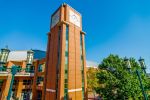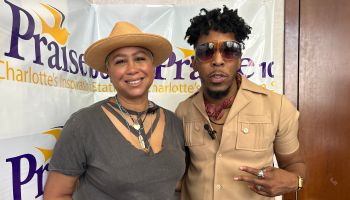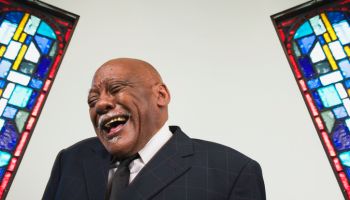VIA JCSU Communications
City and county officials joined Johnson C. Smith University in cutting the ribbon to open the newly renovated George E. Davis House at 301 Campus Street in the West End.
Located across the street from the University’s main entrance, the Queen Anne-style house is a reminder of two educators whose mission was to provide educational equality for all. It was built in 1895 and for 55 years was the residence of the university’s first black professor, George E. Davis, and his wife, Marie G. Davis, a prominent Charlotte public school principal and teacher.
Born in Wilmington, N.C., Davis graduated in 1883 from Biddle University, known today as Johnson C. Smith University, and taught at JCSU for 35 years. He became dean of the faculty in 1905 and retired in 1920. He then became North Carolina’s agent for the Rosenwald Fund, financed by Sears Roebuck President Julius Rosenwald, to build schools for African Americans. His work led to the construction of 813 mostly rural Rosenwald schools across North Carolina, with 26 in Mecklenburg County.
After falling into disrepair for the last 30 years, the vacant house will breathe new life as the administrative hub for the Foster Village Network Center at Johnson C. Smith University. The center’s Guardian Scholars program serves students who have been in Kinship Care arrangements, Emancipated Youth, Wards of the Court, orphans and unaccompanied homeless youth.
The $800,000 renovation project by Andrew Roby General Contractor, received funding from the Cannon Foundation, Committee to Restore and Preserve the Third Ward, Wells Fargo Foundation, Mecklenburg County, the Charlotte Mecklenburg Historic Landmarks Commission and individual support.
“Thanks to the support of neighbors, historians and local preservationists, the restored house serves as an iconic part of the JCSU mission as well as a reminder of two beloved educators whose legacy continues to open up new possibilities for our youth today,” said Dr. Ronald L. Carter, JCSU president.
Special features at the Davis House include a tranquility garden, SMART classrooms, a conference room and offices. In addition to restoring the home, Andrew Roby will create new public sidewalks along Dixon and Campus Streets.
Carter noted the university also received a collection of African art donated in memory of Hyman and Pearl Polk, who married in 1937 and supported numerous causes in Charlotte throughout the years. “Given their true spirit of helping those in need in our community, we could not think of a better place to display this art than in this center which will help youth who have aged out of foster care,” said Carter.
Andrew Roby has deep roots in the Charlotte community, serving the region since 1950.The company has completed historic renovations to Latta Place (built in 1800); the John Dinkins House & Lodge (built in 1800); Rosedale Plantation (built in 1815); the White Homestead (built in 1831); Chairman Blake House (built in 1861); Spring’s Guest House at The Founders House (built in 1870); and the John Price Carr House (built in 1904). The Chairman Blake House in Davidson received the Best in Show award from the Remodelers’ Council, and Spring’s Guest House at The Founders House in Fort Mill was recognized by the North Carolina chapter of the American Institute of Architects.
Historic Davis House Opens As Hub For Foster Village Network Center at JCSU was originally published on oldschool1053.com
















